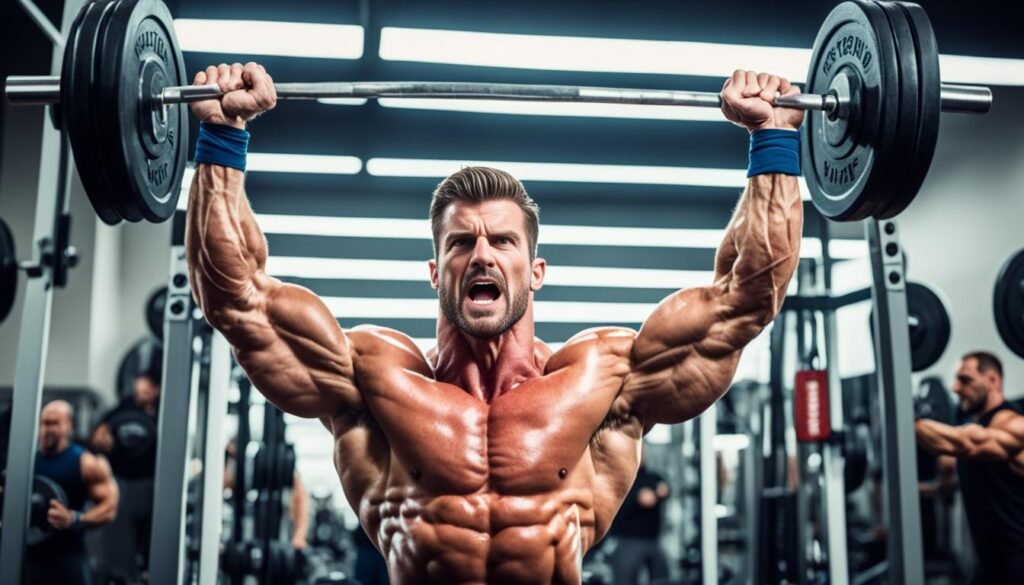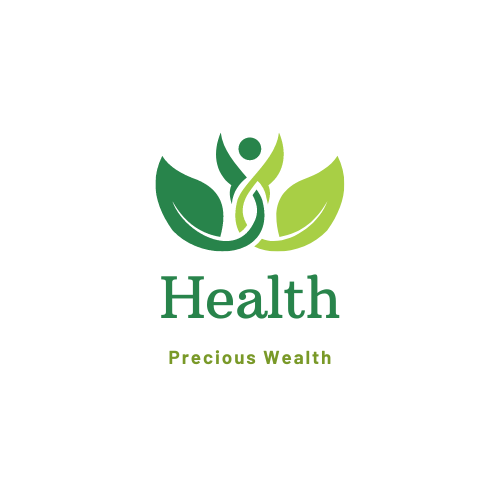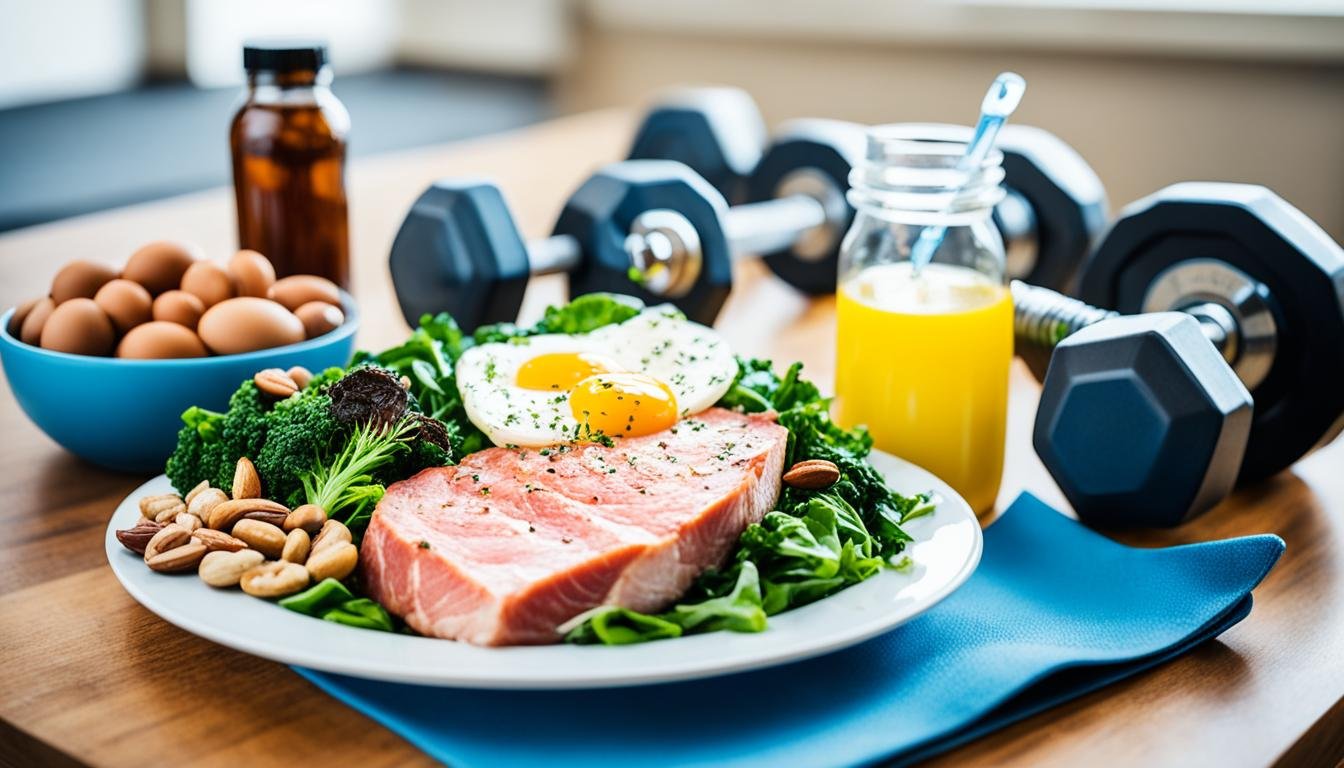Testosterone is a key hormone for men, vital for health, muscle growth, energy, and sexual function. Yet, many men face low testosterone, causing unwanted symptoms. Luckily, you can boost your testosterone naturally with the right diet. This guide will show you the best diet plans and strategies to increase testosterone without supplements or medical help.
Key Takeaways
- Understand the importance of nutrition in maintaining healthy testosterone levels
- Discover the key nutrients and food groups that can naturally boost testosterone production
- Learn how to create a tailored diet plan to optimize your body’s natural testosterone levels
- Explore the synergistic benefits of exercise and lifestyle factors for testosterone enhancement
- Approach natural testosterone supplements with caution and focus on dietary and lifestyle changes
Understanding the Role of Diet in Testosterone Production
Diet is crucial for boosting testosterone levels. Eating right helps keep hormone balance in check. It’s important to know how diet affects testosterone levels.
Importance of Nutrition for Hormone Balance
The food we eat helps our body make hormones, including testosterone. Eating testosterone-boosting foods like lean proteins, healthy fats, and veggies supports testosterone production.
Factors Affecting Testosterone Levels
Many things can change testosterone levels, like age, stress, lifestyle, and health conditions. As men get older, testosterone levels often drop, causing symptoms of low testosterone. But, making smart lifestyle changes for higher testosterone can help.
Stress can lower testosterone by making the body produce more stress hormones. Bad sleep and too much alcohol also hurt testosterone levels. By fixing these issues, men can help their testosterone production.
Knowing how diet affects testosterone is key for men wanting better health and hormone balance. By eating testosterone-boosting foods and changing their lifestyle, men can boost their testosterone levels.
The Testosterone-Boosting Power of Protein
Protein is key for boosting testosterone and muscle growth. Adding high-quality, protein-rich foods to your diet can help men naturally increase their testosterone.
Studies show a strong link between protein and testosterone. Protein helps make hormones, including testosterone. Eating enough protein helps your body make and keep healthy testosterone levels.
But, not all proteins are the same. For boosting testosterone, focus on lean, high-quality protein sources. These include:
- Lean meats like chicken, turkey, and lean beef
- Fish, such as salmon, tuna, and trout
- Eggs, particularly the yolks
- Legumes, including beans, lentils, and chickpeas
- Dairy products like Greek yogurt and cottage cheese
- Nuts and seeds, such as almonds, walnuts, and chia seeds
The right amount of protein for testosterone varies by person. Aim for 0.7 to 1 gram of protein per pound of body weight. You can get this from a balanced diet full of testosterone boosting foods.
| Protein Source | Testosterone Impact |
|---|---|
| Lean Beef | High in zinc, which is essential for testosterone production. |
| Eggs | Contain cholesterol, a precursor to testosterone, and vitamin D, which supports testosterone levels. |
| Salmon | Rich in omega-3 fatty acids, which can help reduce inflammation and support testosterone health. |
| Nuts and Seeds | High in healthy fats, zinc, and magnesium, all of which contribute to optimal testosterone levels. |
Adding a mix of protein-rich foods to your diet plans for increasing testosterone gives your body what it needs. This supports healthy testosterone production and muscle growth.
Healthy Fats: Essential for Optimal Testosterone Levels
Healthy fats are key to keeping testosterone levels in check. Monounsaturated and polyunsaturated fats help the body make testosterone. Adding these fats to your diet can boost testosterone and balance hormones.
Monounsaturated Fats for Testosterone
Monounsaturated fats are in avocados, olive oil, and nuts. They help lower inflammation, which can stop testosterone production. These fats also make enzymes that make testosterone work better.
Polyunsaturated Fats for Testosterone
Polyunsaturated fats, like omega-3 and omega-6, are important for testosterone. Omega-3 is in fatty fish, walnuts, and flaxseeds. It helps make testosterone and makes the body more sensitive to it. Omega-6 is in nuts and seeds and helps keep testosterone balanced.
To get enough of these fats, add these foods to your diet:
- Avocados
- Olive oil
- Nuts (such as almonds, walnuts, and cashews)
- Fatty fish (such as salmon, mackerel, and sardines)
- Flaxseeds and chia seeds
Eating foods rich in testosterone-boosting fats helps support your body’s natural testosterone production. This is a natural way to improve your hormonal health.
Carbohydrates and Testosterone: Finding the Right Balance
Carbohydrates are key in diet plans to boost testosterone naturally. They are the body’s main energy source. Getting the balance right is important for high testosterone levels and good hormonal health.
The kind of carbs you eat affects testosterone. Simple carbs like those in white bread and sugary snacks can raise insulin levels. This might lower testosterone. Complex carbs in whole grains and fruits give energy longer and don’t harm testosterone.
To keep testosterone healthy, eat more complex carbs. These foods give you energy and help your health in many ways.
- Whole grains: Brown rice, quinoa, oats, and whole-wheat bread or pasta are great complex carbs.
- Fruits and vegetables: Foods like apples, berries, spinach, and sweet potatoes help testosterone.
- Legumes: Beans, lentils, and chickpeas offer complex carbs, protein, and fiber.
Choosing these foods and watching your carb intake helps balance your testosterone and lifestyle for better testosterone levels.
| Carbohydrate Source | Effect on Testosterone |
|---|---|
| Simple/Refined Carbohydrates | Potential temporary suppression of testosterone production due to insulin spike |
| Complex Carbohydrates | Sustained energy source without the same hormonal disruption, can support overall health and testosterone levels |
A balanced diet with many foods, exercise, and lifestyle changes is key for boosting testosterone naturally. Understanding carbs’ role helps you make better choices for your testosterone goals.
“Striking the right balance between carbohydrates and other macronutrients is essential for maintaining healthy testosterone levels and overall hormonal balance.”
Zinc: The Mineral Powerhouse for Testosterone Production
Zinc is a key mineral that helps make and keep testosterone, the main male sex hormone. It’s vital for keeping hormone levels balanced and for men’s health. Eating foods high in zinc can help your body make more testosterone naturally.
Zinc-Rich Foods for a Testosterone Boost
There are many foods packed with zinc that can boost your testosterone. Adding these to your diet can help your body make more testosterone naturally.
- Oysters: Known for their high zinc, oysters are a top choice for boosting testosterone.
- Red meat: Lean red meats like beef and lamb are full of zinc and support healthy testosterone.
- Chickpeas: These legumes are loaded with zinc and can be added to many dishes to help boost testosterone.
- Nuts and seeds: Almonds, cashews, and pumpkin seeds are great for their zinc content and support testosterone.
- Dairy products: Milk, cheese, and yogurt are good for zinc, making them great for testosterone-boosting diets.
Eating these zinc-rich foods helps your body make and keep healthy testosterone levels. Adding these foods to your diet is a natural way to support your health and vitality.
| Food | Zinc Content (mg per serving) |
|---|---|
| Oysters (6 medium) | 32.3 |
| Beef (3 oz, cooked) | 5.8 |
| Chickpeas (1 cup, cooked) | 2.5 |
| Almonds (1 oz) | 0.9 |
| Milk (1 cup) | 1.1 |
By eating enough of these zinc-rich foods, you can help your body make more testosterone naturally. This supports your overall health.
Vitamin D: The Sunshine Vitamin for Testosterone Health
Vitamin D is key to boosting testosterone levels naturally. It’s often called the “sunshine vitamin.” This nutrient helps control the body’s testosterone production.
Studies show a link between vitamin D and testosterone. Men with enough vitamin D have more testosterone than those who don’t. Eating foods rich in vitamin D and getting sunlight can help increase testosterone.
Vitamin D and Testosterone: The Synergistic Relationship
Vitamin D affects testosterone in several ways. It can boost cells that make testosterone and control enzymes that change testosterone. It also makes tissues more sensitive to testosterone, making its effects stronger.
Having enough vitamin D is crucial for boosting testosterone. Symptoms of low testosterone, like feeling tired, having a low sex drive, and losing muscle, can get worse without enough vitamin D.
Boosting Vitamin D for Testosterone Health
- Expose your skin to sunlight regularly: Aim for 10-30 minutes of sun exposure, several times per week, to allow your body to produce vitamin D naturally.
- Incorporate vitamin D-rich foods into your diet: Fatty fish, egg yolks, and fortified dairy products are excellent sources of this essential nutrient.
- Consider a vitamin D supplement: If you’re unable to obtain sufficient vitamin D from sunlight and dietary sources, a high-quality supplement may be beneficial.
Getting enough vitamin D helps support natural testosterone production and hormonal balance. Add this to a diet full of nutrients, regular exercise, and a healthy lifestyle. This way, you’ll boost your testosterone levels and enjoy its many benefits.

“Maintaining optimal vitamin D levels is crucial for supporting healthy testosterone production and overall male health.”
diet plans for increasing testosterone
Boosting testosterone levels is key, and what you eat matters a lot. Eating foods rich in nutrients can help your body make more testosterone. We’ll look at diet plans and meal tips to boost your testosterone through food.
Focus on a diet full of testosterone-boosting foods. This means lots of high-quality protein, healthy fats, and vitamins and minerals. A diet plan based on these nutrients can help support your testosterone levels naturally.
Sample Testosterone-Boosting Meal Plan
- Breakfast: Spinach and feta scrambled eggs with avocado and whole-grain toast
- Snack: Greek yogurt with mixed berries and a handful of raw almonds
- Lunch: Grilled salmon with roasted sweet potatoes and sautéed broccoli
- Snack: Hard-boiled eggs and carrot sticks with hummus
- Dinner: Grass-fed beef stir-fry with bell peppers, onions, and quinoa
This meal plan includes foods like eggs, salmon, nuts, and leafy greens. These foods are great for boosting testosterone. They can help increase energy, muscle mass, and overall health.
“A well-balanced, nutrient-rich diet is essential for maintaining optimal testosterone levels. By making strategic dietary choices, you can harness the power of food to boost your testosterone naturally.”
Everyone’s nutritional needs are different, so make your diet plan fit you. Try out various testosterone-boosting foods and meals to see what suits you best.
With the right diet and testosterone-boosting foods, you can improve your testosterone levels. Combine this with exercise and other lifestyle changes for the best results in boosting testosterone naturally.
Exercise: The Synergistic Partner for Testosterone Optimization
Exercise is key to boosting your testosterone levels, along with a diet focused on testosterone. Certain exercises, like resistance training and high-intensity interval training (HIIT), help increase testosterone. This leads to better muscle growth and overall health.
Resistance Training for Testosterone
Regular resistance training, such as weightlifting, raises testosterone levels. It makes your muscles work hard against resistance. This triggers hormonal responses that boost testosterone. Exercises like squats, deadlifts, and bench presses work best for this.
High-Intensity Interval Training (HIIT) for Testosterone
HIIT also boosts testosterone levels. It involves intense exercise followed by rest or low-intensity activity. This type of training causes a bigger hormonal response, including more testosterone, than steady cardio. HIIT workouts can include sprints, plyometrics, and bodyweight exercises in a circuit.
By eating right and exercising with resistance training and HIIT, you can boost your exercise for testosterone, testosterone and muscle growth, and boosting testosterone naturally. This approach helps you gain muscle, improve body composition, and feel better overall.

Lifestyle Factors Influencing Testosterone Levels
Healthy testosterone levels aren’t just about diet and exercise. Lifestyle factors like sleep, stress, and alcohol also matter a lot. Let’s see how these can affect your testosterone production.
Sleep: The Bedrock of Testosterone
Good sleep is key for high testosterone levels. Not sleeping well can lower testosterone. Try to get 7-9 hours of sleep each night to help your body make more testosterone.
Stress Management: Keeping Cortisol in Check
Too much stress can mess with your hormone balance, including testosterone. Stress makes your body produce more cortisol, which can lower testosterone. Use stress-relieving activities like meditation, yoga, or exercise to keep testosterone and cortisol balanced.
Alcohol Consumption: Moderation is Key
Drinking in moderation is okay, but too much can hurt testosterone production. Alcohol can make it hard for your body to process testosterone, lowering your levels. If you want to boost testosterone, drink less or avoid alcohol.
Changing your lifestyle in these areas – sleep, stress, and alcohol – can help keep testosterone levels healthy. This can lead to many benefits.
“Optimizing your lifestyle is just as important as optimizing your diet and exercise routine when it comes to boosting testosterone naturally.”
Natural Testosterone Supplements: Proceed with Caution
Many people look to dietary supplements to boost testosterone naturally. But, it’s important to be careful with these supplements. They are not always safe or effective, since the market is not well regulated.
Natural testosterone supplements promise to increase hormone production without the need for testosterone replacement therapy. But, their effectiveness and safety are still being studied. Before using them, it’s key to know the possible benefits and risks.
Potential Benefits of Natural Testosterone Supplements
- Some supplements may have ingredients like zinc, vitamin D, and certain herbs that help the body make more testosterone.
- They might offer a more natural way to increase testosterone levels than testosterone replacement therapy.
- For people with mild testosterone issues, these supplements could be a good option without needing prescription drugs.
Potential Risks of Natural Testosterone Supplements
- The supplement industry has little regulation, so product quality and safety can vary a lot.
- Some supplements might cause side effects like liver damage, heart problems, or hormonal imbalances.
- They could also interact with other medicines, leading to serious issues.
- Many natural testosterone supplement companies make big claims that aren’t backed up by science, which can trick consumers.
Before trying natural testosterone supplements, talk to a healthcare professional. They can give you advice that fits your specific situation and health history. This way, you can make smart choices and avoid the risks.
“The best way to boost testosterone is with a healthy diet, regular exercise, and managing stress. Don’t just rely on supplements.”
Conclusion
In this guide, we’ve looked at the best ways to increase testosterone levels naturally. We focused on important nutrients like protein, healthy fats, and zinc-rich foods. These can help boost testosterone and improve health.
Exercise was also highlighted as a key factor. Resistance training and high-intensity interval training are great for testosterone.
We talked about how lifestyle affects testosterone too. Getting enough sleep, managing stress, and drinking alcohol in moderation are important. Natural supplements can also help, but always talk to a doctor first.
A balanced approach is key to boosting testosterone levels. By using the tips from this guide, you can improve your diet and naturally increase testosterone. This can lead to better muscle growth and overall health.
FAQ
What are the best diet plans for increasing testosterone naturally?
Eating foods high in protein, healthy fats, and the right carbs is key. Choose lean meats, fish, eggs, nuts, seeds, and leafy greens to boost testosterone.
What are the top testosterone-boosting foods?
Top foods for boosting testosterone include oysters, beef, eggs, garlic, ginger, pomegranates, and nuts like almonds, walnuts, and pumpkin seeds.
Are there any natural testosterone supplements that can help?
Natural supplements like zinc, vitamin D, and ashwagandha can help. But, talk to a healthcare professional before starting them.
What types of exercise are best for increasing testosterone?
Resistance training and high-intensity interval training (HIIT) work well. These exercises boost testosterone by stimulating natural production.
How can lifestyle changes impact testosterone levels?
Good sleep, managing stress, and drinking less alcohol can help. These changes support healthy testosterone levels.
What are the common symptoms of low testosterone?
Low testosterone can cause fatigue, a drop in sex drive, muscle loss, weight gain, mood swings, and trouble concentrating and remembering things.
How does testosterone replacement therapy work?
Testosterone replacement therapy (TRT) uses testosterone supplements, often through injections, patches, or gels. It’s for people with low testosterone and should be under a doctor’s care.
How do testosterone levels change with age?
Testosterone levels drop about 1% a year after 40. But, this can vary a lot from person to person.
Can boosting testosterone naturally improve muscle growth?
Yes, high testosterone is key for muscle growth and lean mass. A diet and lifestyle that boost testosterone can lead to better muscle development and body shape.

